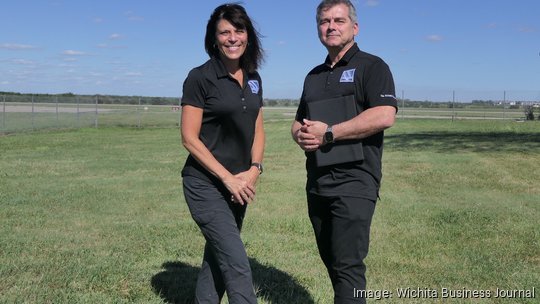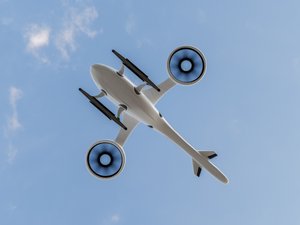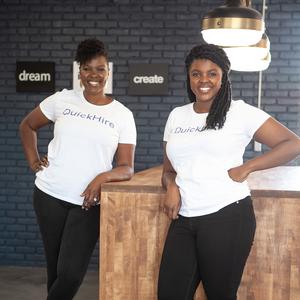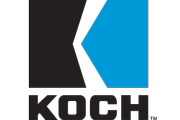
The AirCraft Company, a Wichita-based startup launched by a local husband and wife team, is working to develop a new 30-seat hybrid-electric plane with the goal to launch by 2029.
The aircraft, which was announced earlier this year, will eventually be part of a family of three hybrid aircrafts to be designed and manufactured in the Air Capital.
The founders are Mario Asselin, an aviation engineer, and Sylvie St-Georges, a former flight test pilot — and both have years of experience in aircraft services and flight testing. Though they're from Canada, the couple says they have made Wichita home and could think of no other place than the Air Capital to start their business and tap into a high-growth industry.
"We need to grow quickly," St-Georges said. "The market, the need is going to be so big so quickly. We need to actually look for more companies in the U.S. to start doing what we're doing just so that we can fulfill the demand because I do believe that demand is going to be tremendous."
Outside of The AirCraft Company, the couple also runs the Wichita-based Asselin Inc., an aviation company that services small and transit airplanes.
Along with going green, the new electric airplane family, known as Pangea, will have larger seats, more legroom, bigger windows and wider aisles — simply, it will be more comfortable for the passenger.
The founders also want to make the commuter planes wheelchair-friendly. In addition to the wider seats and aisles, they propose to construct a larger restroom that a person in a wheelchair could maneuver into.
"Let's make sure that everybody can have a restroom because if you're saying you don't want a disability restroom, you're basically telling your customer don't have a drink, don't have water, don't drink coffee," St-Georges said. "That's what you're telling them at the same time."
This new hybrid-electric propulsion system plane will rely on battery power. After 400 miles, it will switch to sustainable aviation fuel, or SAF. But as the plane will make short trips, rarely will it need to switch to SAF as they expect most flights to run around 200 miles, including Wichita to both Garden City and Kansas City.
As for emergency landings, Asselin said they are always in the plan.
"You will use the same operating rules as everybody else, so you plan for flight," he said. "If you think you need an alternate, you'll have fuel to go to that alternate and reserves."
Because of the electricity-generated model, the costs of flying will decrease.
"I'm going to use about three to four times less energy to fly; there's a reduced cost of operation," Asselin said. "So the cost of electricity is well known and fairly stable compared to the price of fuel."
The AirCraft Company has a small team of engineering consultants and others working for them. They hope to get the prototype available by 2027 and the first plane built by around 2029. The other two planes in the family will come later. They are looking at a 50-seat and 125-seat passenger plane, but say they are willing to build to suit their customer's specifications. They are also hoping to outfit each model for cargo, military or emergency services use.
"We will do what the client wants," St-Geroges said.
As for the benefits of landing in smaller communities, the plane does not make much noise. The AirCraft Company wants to provide an economic incentive for airlines to return to smaller communities, leaving the big hubs.
"You have zero noise to taxi, and it's only propellers," Asselin said. "There's no engine noise, so you only have propeller noise, and as soon as you stop moving, you go again with zero noise. So when a small airport comes close to a community, that's very important."
The couple hopes to use the resources at the National Institute for Aviation Research at Wichita State University and operate out of Colonel James Jabara Airport.
The Wichita-based startup, The AirCraft Company, already has an investor overseas, but they are hoping to get several American investors as well.
"We are testing this aircraft already because we have built a full-blown simulator in our own home," St-Georges said. "It's been tested by pilots and flight test pilots. So we have already done that. So we know that the product that we've got is good."
Who else is making an electric plane?
Several other companies are working on electric planes, including Textron eAviation — a Textron (NYSE:TXT) company based in Wichita — Heart Aerospace in Sweden and Maeve Aerospace in The Netherlands. Pipistrel, which is based in Slovenia and is part of Textron eAviation, already has a working electric plane.
Heart Aerospace employs 130 workers, but, according to their website, the company is growing rapidly and expects to employ around 500 people by 2025. The Swedish company plans to start test flights of its electric airplane sometime in 2026, with an expected delivery date of 2028.
Maeve Aerospace of the Netherlands, with the help of Siemens aircraft design and simulations suite, hopes to be flying by 2030, a release said.





